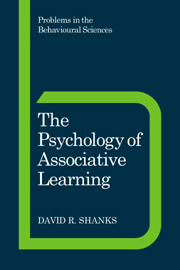1 - Introduction
Published online by Cambridge University Press: 26 January 2010
Summary
It is hard to think of any significant aspect of our lives that is not influenced by what we have learned in the past. The world looks and sounds the way it does because as infants we learned to partition it up in certain meaningful ways: we see familiar faces rather than meaningless blobs of colour and hear words rather than noise. Similarly, we behave in the ways we do because we have learned from past experience that our various actions have certain specific consequences. Like many topics of psychological inquiry, the importance of learning can perhaps best be realised by considering what life is like for people who have learning difficulties. Consider the case of Greg, a patient described by Sacks (1992), who became profoundly amnesic as a result of a benign brain tumour that was removed in 1976. Although his memory for events from his early life was almost completely normal, Greg remembered virtually nothing that had happened to him from 1970 onwards and appeared quite unable to learn anything new. He continued to believe, for instance, that Lyndon Johnson was the American President. In 1991 he was taken to a rock concert given by a group that he had been a great fan of in the 1960s, and despite sitting through the concert in rapture and recalling many of the songs, by the next morning he had no memory of the concert. More distressingly, when told of his father's death he was immeasurably sad but forgot the news within a few minutes. He was unable to learn that his father was no longer alive, and relived his grief anew every time he was told the news.
- Type
- Chapter
- Information
- The Psychology of Associative Learning , pp. 1 - 19Publisher: Cambridge University PressPrint publication year: 1995

